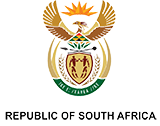Quality healthcare for all
Strengthening our health system and working to guarantee quality healthcare for all South Africans are top government priorities.
Significant progress has been made in our national effort to achieve these objectives.
2nd Presidential Health Compact 2024-2029
The Second Presidential Health Compact 2024-2029 was signed on 22 August 2024. Stakeholders committed to establishing a unified, integrated and responsive health system that provides quality health care for the entire population.
The signing was attended by representatives of government, health professionals, labour, business, civil society, health service users, academics and research organisations, as well as traditional and allied health professionals.
The Presidential Health Compact consists of a nine-pillar plan of action including:
Augmenting human resources for the health operational plan.
Better management of supply chain equipment and machinery for improved access to essential medicines, vaccines and medical products.
Execution of the infrastructure plan to ensure adequate, appropriately distributed, well-maintained health facilities.
Engaging the private sector in improving health services’ access, coverage and quality.
Improving health services’ quality, safety and quantity, focusing on primary health care.
Improving the efficiency of public sector financial management systems and processes.
Strengthening governance and leadership to improve oversight, accountability and health system performance at all levels.
Engaging and empowering the community to ensure adequate and appropriate community-based care.
Developing an information system to guide the health system’s policies, strategies and investments.
Through strategic partnerships, meaningful collaborations and innovation approaches, efficient, equitable and improved health outcomes can be achieved.
In advancing the health and the well-being of South Africans, we must do everything we can to ensure that no person is left behind.
President Cyril Ramaphosa
Achievement highlights
50 000 new healthcare and support posts created
77% of HIV+ people initiated on antiretroviral therapy
Over 60 million people registered on NHI database
Over 3 000 clinics and 34 hospitals registered on NHI database
The National Health Insurance
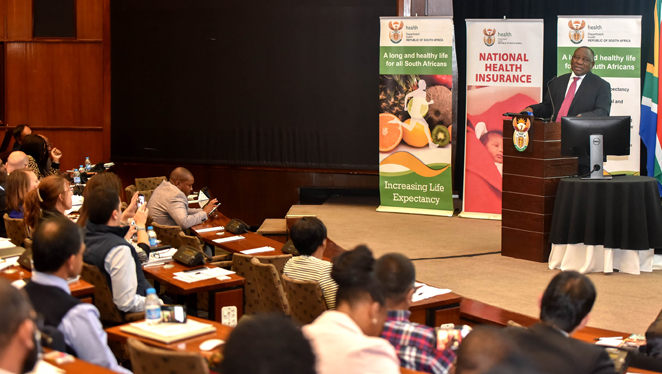
President Cyril Ramaphosa addresses NHI Stakeholder Consultative Meeting
The National Health Insurance (NHI) is a health financing system that aims to provide access to quality healthcare for all South Africans as enshrined in the Constitution – regardless of their ability to pay.
Universal healthcare is vital to addressing the needs of the most vulnerable and disadvantaged members of our society – and the key to tackling inequalities within the public healthcare system.
The National Health Insurance (NHI) Bill
President Ramaphosa signed the NHI Bill into law on 15 May 2024.
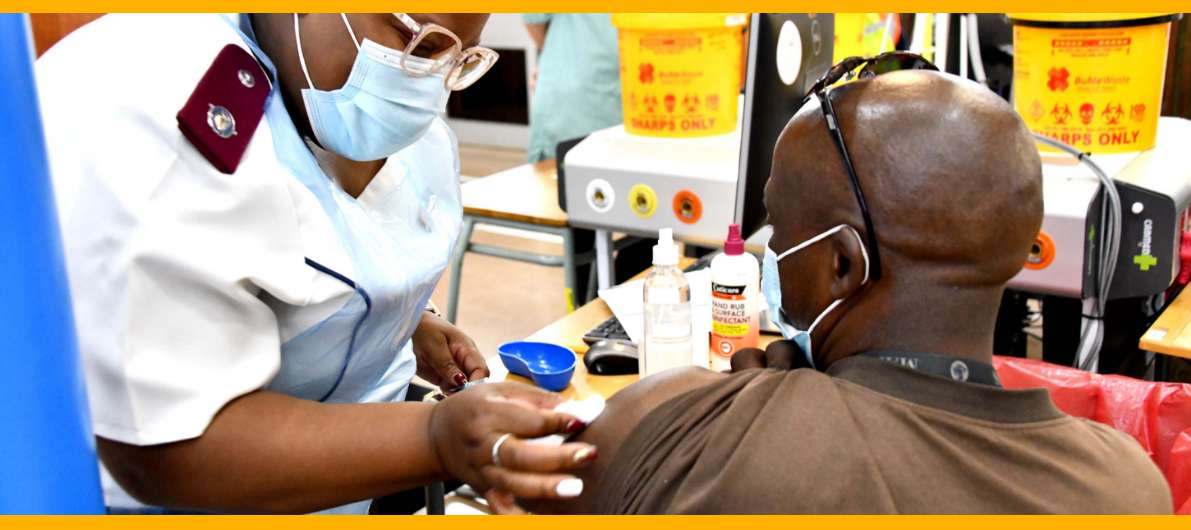
Administering the COVID-19 vaccine
Defeating COVID-19
The World Health Organization (WHO) declared in May 2023, that COVID-19 is no longer a public health emergency.
This was determined on the basis of declining infection rates, hospital admissions and deaths. South Africa’s comprehensive response to overcome the coronavirus was crucial to our nation’s economic recovery and future growth.
Since we launched our public vaccination programme in May 2021, over 25 million vaccine doses have been administered. This is a remarkable achievement – by far the biggest health intervention in South Africa in such a short period of time.
Together with the private sector, we established the Solidarity Fund, which raised R3.4 billion for South Africa’s response to COVID-19 and the health, humanitarian and social consequences.
As part of the relief package, an additional R20 billion was allocated for the health response to the pandemic, and R20 billion for municipalities for the provision of emergency water, food and shelter for the homeless.
Rollout Progress
37.5 million
Doses administered
> 50%
Adults fully vaccinated
65%
People over 50 fully vaccinated
Vaccination against COVID-19 is the easiest and most effective way to protect ourselves against severe illness or death – and to help our economy recover.
LEADING AFRICAN UNION COVID RESPONSE
Secured over 500 million COVID vaccine doses for the continent.
Established the African Pandemic Response Fund, which has to date mobilised $137 million for local production of vaccines, diagnostics, personal protective equipment, oxygen and critical medicines.
Launched the Africa Medical Supplies Platform, ensuring access for all African countries to vital COVID supplies.
Vaccine production
South Africa remains concerned about inequalities in COVID-19 vaccine access for developing countries. Working together with local and international partners, we have made great progress over the past year in building our vaccine manufacturing capabilities.
We now have two South African companies – Aspen and Biovac – with contracts to produce COVID-19 vaccines and two additional vaccine projects have also been announced.
In addition, we have full local production capability for ventilators, hand sanitisers, medical-grade face masks and gloves, and therapeutic drugs and anaesthetics.
This production capability is worth billions of rands of production annually.
Vaccine production progress
A COVID-19 vaccine technology transfer ‘hub’ is being set up in South Africa in collaboration with the World Health Organization and other partners to boost production and access to COVID vaccines.
R3 billion has been invested in a new vaccine manufacturing facility in Cape Town. NantSA aims to generate one billion doses of various vaccines by 2025.
In the media
New era of health science for Africa as NantSA launches vaccine-manufacturing campus
“Africa stands ready to enter a new age of medical science,” President Cyril Ramaphosa said, speaking at the official launch of NantSA’s manufacturing campus at Brackengate, Cape Town.
Mail & Guardian
Bolstering Africa’s vaccine manufacturing capabilities
Africa should invest more into its vaccine manufacturing capabilities and innovations so that it can respond timeously to outbreaks of future pandemics. This was a key point made at the media launch of the 6th edition of the annual BIO Africa Convention on Tuesday, at the Bigen Innovation Hub in Pretoria.
Mail & Guardian
Positioning Africa as a vaccine manufacturing hub
Judging by the high number of attendees, the level of enthusiasm among the participants and the quality of discussions, this year’s installment of BIO Africa Convention was a resounding success. Held annually since its inception in 2018, the convention brings together industry experts, researchers, academics, policymakers, entrepreneurs and innovators from across the globe.
Mail & Guardian
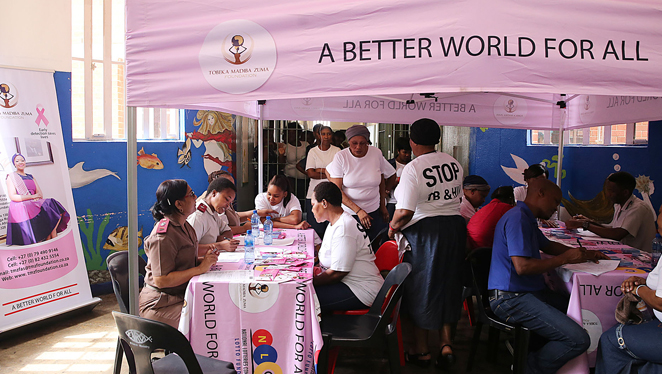
TB and HIV testing underway at Westville Prison in KwaZulu-Natal
Fighting disease
We are intensifying efforts to end HIV as a public health threat, turn the tide against tuberculosis and tackle the epidemic of non-communicable diseases like diabetes and hypertension.
Over the next 3 years, R82.6 billion will be spent on disease-specific programmes in South Africa.
HIV
South Africa has the biggest HIV epidemic in the world, with approximately 7.8 million people living with the disease.
Our focus has been on providing free basic healthcare and extensive programmes to combat HIV, which includes having the largest antiretroviral treatment programme in the world. This strategy has improved the life expectancy of South Africans and reduced mother-to-child transmission and child mortality.
South Africa will soon be transitioning to the 95-95-95 UN targets, aimed at bringing about an HIV-free generation.
PROGRESS ON 90:90:90 HIV TARGETS

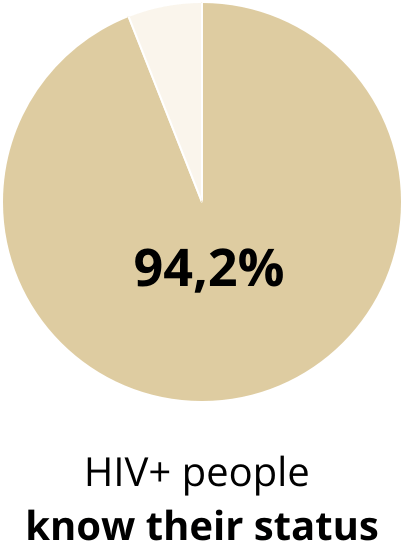
HIV+ people know their status
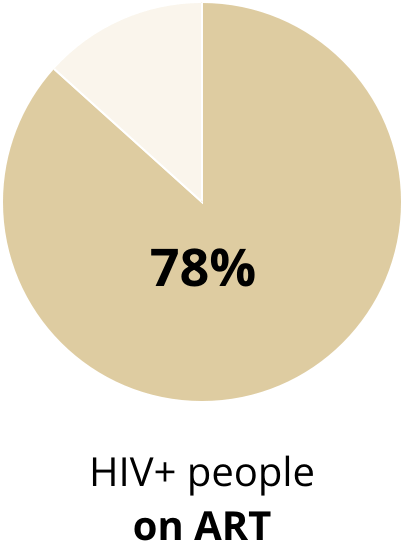
HIV+ people on ART
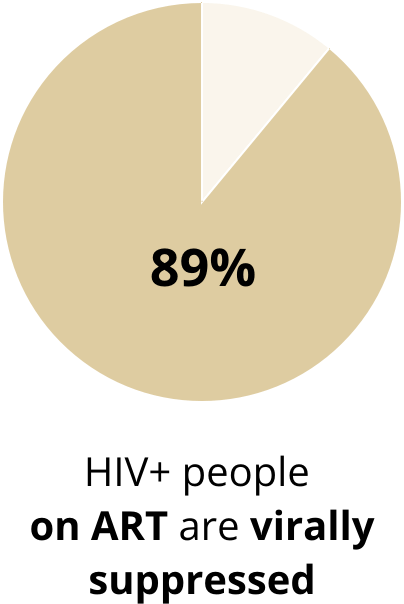
HIV+ people on ART are virally suppressed
TB
We have adopted the 90:90:90 treatment approach advocated by UNAIDS and the Stop TB Partnership.
In the media
Government reveals plans to restore TB services in South Africa
The Covid-19 pandemic and associated lockdowns have dealt a severe blow to South Africa’s tuberculosis response. Tiyese Jeranji asked government about how it aims to get TB diagnosis, treatment, and prevention services back on track.
Daily Maverick
Novel diagnostic testing technique: a game-changer in the fight against TB
Tuberculosis (TB) remains a major public health priority globally, and the foremost infectious disease killer in sub-Saharan Africa. In many TB-endemic countries, it sets back national gross domestic product by between 2 and 3% – with approximately 11 million people falling ill with TB for the first time annually.
www.news.uct.ac.za
Healthcare facilities
To deliver quality healthcare services for all, it is essential that we fix and improve public health facilities around the country, and build new hospitals and clinics to expand access. These facilities must also be provided with adequate medical equipment and skilled staff. Improving the quality of public health facilities is vital to ensure they are ‘NHI-ready’.
Hospitals and clinics
We have committed R20.6 billion over the next three years to upgrade and restore our health facilities. From 2014 to 2021, 10 hospitals were completed or replaced and an additional 23 were revitalised.
Healthcare facilities in 2021
14
Public health facilities constructed/revitalised
11
Public health facilities maintained/repaired/refurbished
3
Hospitals constructed/revitalised
Healthcare jobs
In 2021, 50 000 new healthcare and support posts were created. Despite disruptions to the academic year due to the pandemic, 2 500 medical interns and 10 500 community service personnel (including medical doctors, nurses and pharmacists) were placed last year.
Did you know? The Health and Welfare Sector Education and Training Authority (HWSETA) has launched a career portal aimed at informing learners about careers in health. Find out more.
Empowering people with disabilities
People with disabilities are among the most marginalised members of our society. Government is taking steps to empower those living with disabilities and to ensure their rights are protected.
The African Disability Protocol
This year, South Africa will ratify the African Union Protocol on the Rights of Persons with Disabilities as part of our efforts to end disability discrimination and improve the lives of millions of people living with disabilities.
This legal framework is unique to the African context and will address the exceptional challenges people with disabilities face when it comes to accessing decent employment, healthcare and education.
Disability Rights Bill
South Africa’s Disability Rights Bill will soon come into effect to empower law enforcement agencies and our courts to deal with offences and all forms of discrimination against persons with disabilities.
South African Sign Language
South Africa has made great progress in promoting the recognition and use of sign language in schools and public spaces.
South African Sign Language is now officially recognised as a home language in schools and has been added as the country’s 12th official language.
